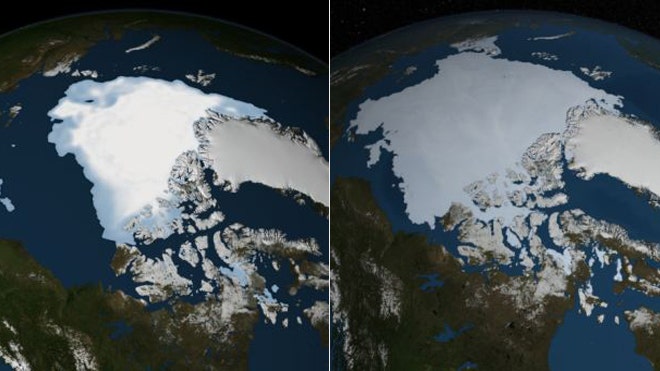Arctic sea ice up 60 percent in 2013
FoxNews.com
About a million more square miles of ocean are covered in ice in
2013 than in 2012, a whopping 60 percent increase -- and a dramatic
deviation from predictions of an "ice-free Arctic in 2013," the Daily Mail noted .
.
Arctic sea ice averaged 2.35 million square miles in August 2013, as compared to the low point of 1.32 million square miles recorded on Sept. 16, 2012, according to the National Snow and Ice Data Center. A chart published Sept. 8 by NSIDC shows the dramatic rise this year, putting total ice cover within two standard deviations of the 30-year average.
Noting the year over year surge, one scientist even argued that "global cooling" was here.
"We are already in a cooling trend, which I think will continue for the next 15 years at least. There is no doubt the warming of the 1980s and 1990s has stopped,” Anastasios Tsonis of the University of Wisconsin told London’s Mail on Sunday.
The surge in Arctic ice is a dramatic change from last year’s record-setting lows, which fueled dire predictions of an imminent ice-free summer. A 2007 BBC report said the Arctic could be ice free in 2013 -- a theory NASA still echoes today.
"[An ice-free Arctic is] definitely coming, and coming sooner than we previously expected,“ Walt Meier, a glaciologist at NASA's Goddard Space Flight Center in Greenbelt, Md, told LiveScience last month. “We're looking at when as opposed to if.”
Noting the growth in ice, the Snow and Ice Data Center said that coverage was still well below the 30-year average. And the year over year growth in ice is “largely irrelevant,” argued The Guardian, noting that more ice is to be expected after the record low a year ago.
“We should not often expect to observe records in consecutive years. 2012 shattered the previous record low sea ice extent; hence 'regression towards the mean' told us that 2013 would likely have a higher minimum extent,” wrote Dana Nuccitelli.
Meanwhile, global surface temperatures have been relatively flat over the past decade and a half , according to data from the U.K.’s weather-watching Met Office.
, according to data from the U.K.’s weather-watching Met Office.
A leaked draft of the next major climate report from the U.N. cites numerous causes to explain the slowdown in warming: greater-than-expected ash from volcanoes, a decline in heat from the sun, more heat being absorbed by the deep oceans, and so on.
Climate skeptics have spent months debating the weather pattern, some citing it as evidence that global warming itself has decelerated or even stopped.
"The absence of any significant change in the global annual average temperature over the past 16 years has become one of the most discussed topics in climate science," wrote David Whitehouse of the Global Warming Policy Foundation in June. "It has certainly focused the debate about the relative importance of greenhouse gas forcing of the climate versus natural variability."
 .
.Arctic sea ice averaged 2.35 million square miles in August 2013, as compared to the low point of 1.32 million square miles recorded on Sept. 16, 2012, according to the National Snow and Ice Data Center. A chart published Sept. 8 by NSIDC shows the dramatic rise this year, putting total ice cover within two standard deviations of the 30-year average.
Noting the year over year surge, one scientist even argued that "global cooling" was here.
"We are already in a cooling trend, which I think will continue for the next 15 years at least. There is no doubt the warming of the 1980s and 1990s has stopped,” Anastasios Tsonis of the University of Wisconsin told London’s Mail on Sunday.
The surge in Arctic ice is a dramatic change from last year’s record-setting lows, which fueled dire predictions of an imminent ice-free summer. A 2007 BBC report said the Arctic could be ice free in 2013 -- a theory NASA still echoes today.
"[An ice-free Arctic is] definitely coming, and coming sooner than we previously expected,“ Walt Meier, a glaciologist at NASA's Goddard Space Flight Center in Greenbelt, Md, told LiveScience last month. “We're looking at when as opposed to if.”
Noting the growth in ice, the Snow and Ice Data Center said that coverage was still well below the 30-year average. And the year over year growth in ice is “largely irrelevant,” argued The Guardian, noting that more ice is to be expected after the record low a year ago.
“We should not often expect to observe records in consecutive years. 2012 shattered the previous record low sea ice extent; hence 'regression towards the mean' told us that 2013 would likely have a higher minimum extent,” wrote Dana Nuccitelli.
Meanwhile, global surface temperatures have been relatively flat over the past decade and a half
 , according to data from the U.K.’s weather-watching Met Office.
, according to data from the U.K.’s weather-watching Met Office.A leaked draft of the next major climate report from the U.N. cites numerous causes to explain the slowdown in warming: greater-than-expected ash from volcanoes, a decline in heat from the sun, more heat being absorbed by the deep oceans, and so on.
Climate skeptics have spent months debating the weather pattern, some citing it as evidence that global warming itself has decelerated or even stopped.
"The absence of any significant change in the global annual average temperature over the past 16 years has become one of the most discussed topics in climate science," wrote David Whitehouse of the Global Warming Policy Foundation in June. "It has certainly focused the debate about the relative importance of greenhouse gas forcing of the climate versus natural variability."
Read more: http://www.foxnews.com/science/2013/09/09/arctic-sea-ice-up-60-percent-in-2013/#ixzz2eWScSD4H


No comments:
Post a Comment